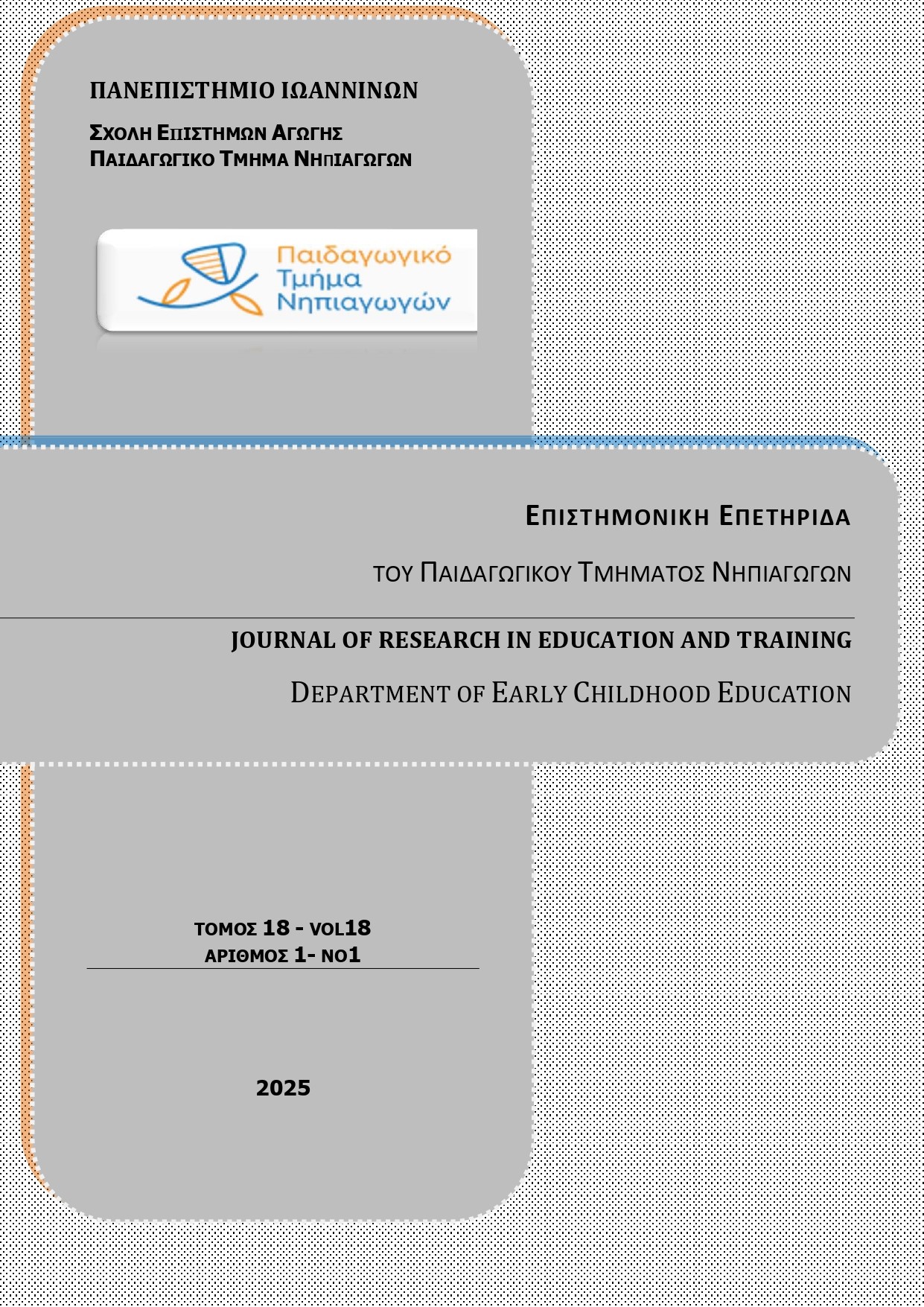Πρώιμη ανίχνευση και αντιμετώπιση των μαθητών με δυσκολίες στον ψυχοκοινωνικό και μαθησιακό τομέα η Ενιαία Κλίμακα Αξιολόγησης και Παρέμβασης σε επίπεδο τάξης

Περίληψη
Μία από τις μεγαλύτερες προκλήσεις που καλούνται να αντιμετωπίσουν οι Έλληνες εκπαιδευτικοί στη μετά-COVID εποχή αποτελεί ο περιορισμός ενός αυξανόμενου αριθμού μαθητών που εκδηλώνουν συναισθηματικές και συμπεριφορικές δυσκολίες. Οι σύγχρονες εξελίξεις επισημαίνουν μία σημαντική στροφή, από την παραδοσιακή έμφαση στην αντιμετώπιση των έντονων προβλημάτων μεμονωμένων μαθητών, προς την κατεύθυνση της πρόληψης και στην παροχή υποστήριξης στο σύνολο του μαθητικού πληθυσμού. Ο καθολικός προσυμπτωματικός έλεγχος αποτελεί έναν ακριβή τρόπο προληπτικής αξιολόγησης των επιπέδων κινδύνου που διατρέχουν οι μαθητές να εκδηλώσουν συμπεριφορικές, συναισθηματικές και μαθησιακές προκλήσεις. Η παρούσα εργασία εστιάζει στην πιλοτική προσαρμογή, σε δείγμα Ελλήνων δασκάλων (Ν=38) και μαθητών (Ν=343), ενός νέου εργαλείου καθολικού προσυμπτωματικού ελέγχου. Συγκεκριμένα η Ενιαία Κλίμακα Αξιολόγησης και Παρέμβασης σε Επίπεδο Τάξης η αποτελείται από εβδομήντα τέσσερα συνολικά στοιχεία αξιολογεί και αναδεικνύει τη στοχοθεσία των εκπαιδευτικών παρεμβάσεων στους εξής τομείς: α) Συμπεριφορές Απορρύθμισης/Προβλήματα Ακαδημαϊκής Επίδοσης, β) Διαταρακτικές/Επιθετικές Συμπεριφορές γ) Αγχώδη/Καταθλιπτική Συμπεριφορά/ες και δ) Συμπεριφορές Κοινωνικής Απόσυρσης: Αποφυγή άλλων ανθρώπων ή ομαδικών δραστηριοτήτων. Περιγράφονται η δομή, το περιεχόμενο, τα αποτελέσματα των συσχετίσεων αξιολόγησης-επαναξιολόγησης, το μέγεθος της ακρίβειας ταξινόμησης καθώς και της παραγοντικής ανάλυσης της κλίμακας.
Λεπτομέρειες άρθρου
- Πώς να δημιουργήσετε Αναφορές
-
Διδασκάλου Ε., & Ρούση-Βέργου Χ. (2025). Πρώιμη ανίχνευση και αντιμετώπιση των μαθητών με δυσκολίες στον ψυχοκοινωνικό και μαθησιακό τομέα: η Ενιαία Κλίμακα Αξιολόγησης και Παρέμβασης σε επίπεδο τάξης. Επιστημονική Επετηρίδα Παιδαγωγικού Τμήματος Νηπιαγωγών Πανεπιστημίου Ιωαννίνων, 18(1), 1–25. https://doi.org/10.12681/jret.37033
- Τεύχος
- Τόμ. 18 Αρ. 1 (2025): -
- Ενότητα
- Άρθρα

Αυτή η εργασία είναι αδειοδοτημένη υπό το CC Αναφορά Δημιουργού – Μη Εμπορική Χρήση – Παρόμοια Διανομή 4.0.
Οι συγγραφείς που δημοσιεύουν σε αυτό το περιοδικό συμφωνούν στους παρακάτω όρους :
1. Οι συγγραφείς διατηρούν τα δικαιώματα πνευματικής ιδιοκτησίας επί των άρθρων τους, χορηγώντας στο περιοδικό το δικαίωμα της πρώτης δημοσίευσης. Άρθρα που δημοσιεύονται στο περιοδικό «Επιστημονική Επετηρίδα του Παιδαγωγικού Τμήματος Νηπιαγωγών της Σχολής Επιστημών Αγωγής του Πανεπιστημίου Ιωαννίνων» διατίθενται με άδεια Creative Commons 4.0, σύμφωνα με την οποία μπορούν να χρησιμοποιούνται ελεύθερα, με αναφορά στο/στη συγγραφέα και στην πρώτη δημοσίευση για μη κερδοσκοπικούς σκοπούς.
2. Οι συγγραφείς μπορούν να συνάπτουν ξεχωριστές, πρόσθετες συμβάσεις και συμφωνίες για την μη αποκλειστική διανομή του δημοσιευμένου στο περιοδικό έργου (π.χ. κατάθεση σε ένα ιδρυματικό αποθετήριο ή δημοσίευση σε ένα βιβλίο), με την αναγνώριση της πρώτης δημοσίευσης σε αυτό περιοδικό.
3. Στους συγγραφείς επιτρέπεται να δημοσιεύσουν την εργασία τους online (κατά προτίμηση σε ιδρυματικά αποθετήρια ή στην ιστοσελίδα τους) πριν και κατά τη διάρκεια της διαδικασίας υποβολής, καθώς αυτό μπορεί να οδηγήσει σε παραγωγικές ανταλλαγές, όπως επίσης και παλαιότερες και ευρύτερες παραπομπές δημοσιευμένων εργασιών (The Effect of Open Access)


